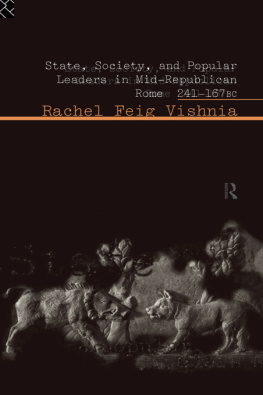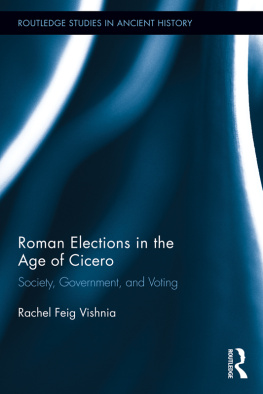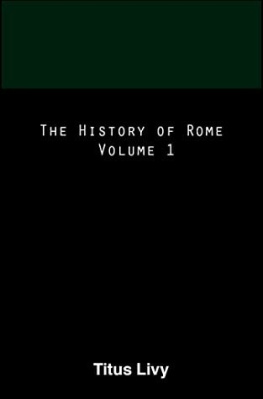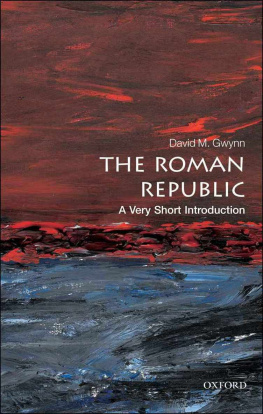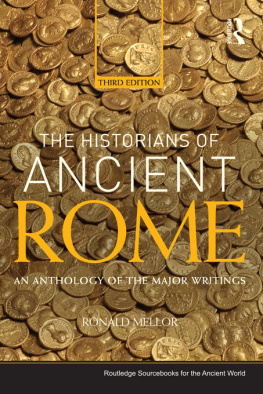STATE, SOCIETY AND POPULAR LEADERS IN MID-REPUBLICAN ROME 24167 BC
STATE, SOCIETY AND POPULAR LEADERS IN MID-REPUBLICAN ROME 241167 BC
Rachel Feig Vishnia
London and New York
First published 1996 by Routledge
2 Park Square, Milton Park, Abingdon, Oxon, OX14 4RN
Simultaneously published in the USA and Canada
by Routledge
270 Madison Ave, New York NY 10016
Transferred to Digital Printing 2007
1996 Rachel Feig Vishnia
Typeset in Garamond by Routledge
All rights reserved. No part of this book may be reprinted or reproduced or utilized in any form or by any electronic, mechanical, or other means, now known or hereafter invented, including photocopying and recording, or in any information storage or retrieval system, without permission in writing from the publishers.
British Library Cataloguing in Publication Data
A catalogue record for this book is available from the British Library
Library of Congress Cataloguing in Publication Data
Feig Vishnia, Rachel, 1950
State, society, and popular leaders in mid-Republican Rome,
241167 B.C.
p. cm.
Includes bibliographical references and index. 1. RomePolitics and government26530 B.C. 2. Plebs (Rome)Politics and government. 3. RomeSocial conditions. I. Title.
DG241.2.F45 1996
937.04dc20 95-39442
CIP
ISBN 0415105129
In memory of my grandparents Rachel and Mordechai Feig whom I never knew
CONTENTS
ACKNOWLEDGEMENTS
This book was originally planned as an expanded version of my dissertation Tribunician Legislation and Activity 232167 BC written at Tel Aviv University under the supervision of Professor Zvi Yavetz and submitted in December 1989. However, while rereading the sources and re-examining the evidence, I became intrigued by a whole set of new and perplexing questions that eventually led me to explore new directions. I became convinced that a reassessment of both tribunician legislation and activity could throw valuable light on Romes political system and the fabric of her society during the middle Republic, as well as offer another answer to the much-debated question of the nature of Roman republican government.
In the course of the years, I have incurred many debts and I am glad that I now have the opportunity to acknowledge them. Apart from my gratitude to the supervisor of my thesis, Professor Zvi Yavetz, I should like to thank two special people who have in many ways shaped my historical thinking. I owe a unique debt to Professor Benjamin Cohen, teacher, colleague and dear friend, whose seminar on Ciceros Republic first fired my interest in Roman republican history. My fascination with the issues discussed in this seminar grew constantly over the years and eventually led me to abandon a Masters degree in Russian history and start ancient history from scratch. Over the years, Professor Cohen has remained a close and supportive friend. His wisdom, searching questions and constructive criticism have contributed immeasurably to my understanding of Roman social relations. Professor Michael Confino, with whom I studied Russian history as a graduate student, has remained a wise adviser and a friend. What I have learned from him about historical thinking, methodology and exposition was of invaluable use to me when I turned to the study of ancient history.
I am greatly indebted to Professor Benjamin Isaac and Professor Zeev Wolfgang Rubinsohn, who both meticulously read and commented on the first part of this book. I am particularly grateful to Professor Fergus Millar, who read the whole typescript with exceptional speed, even though he could ill afford the time. His careful criticism and fruitful suggestions doubtless improved the final product. My friend and colleague Yechiel Zlattner has helped me in the laborious task of proofreading and saved the text from many embarrassing errors. My very special thanks go to my dear friend, Philippa Shimrat, who claims she has only polished my English, but we both know that her sharp mind and common sense have saved the typescript from many shortcomings and greatly contributed to its final shape. To Richard Stoneman, Routledges senior editor of classical studies, I am indebted for his encouragement and patience, and to Mark Majurey, production editor, for his cooperation. Above all, I am indebted to my friend and colleague Professor Zeev Rubin, who guided my first and hesitant steps in ancient history and helped me struggle with both Latin and Greek. He has been a never-failing source of support and encouragement throughout the years and I constantly drew on his extraordinary knowledge of Roman history and the ancient languages. Our frequent conversations often set me on many a fruitful trail, and his valuable advice and criticism at various stages in the preparation of this book improved both my thinking and my exposition. Without his unwavering support and warm friendship it would have been extremely difficult for me to complete this work. Of course, none of the above is responsible for errors of fact or any opinions expressed in this book.
Special thanks are due to my family: my parents, Jamie and David Feig, without whose babysitting services and unrelenting support I would have been unable to embark on the long and arduous journey into the past. My children, Guy and Michael, who have for many years now borne with stoical patience what they regard as their mothers odd occupation, and four-year-old Orly, who followed the progress of this book closely from her favourite seat in front of the computer her mothers lap. And to my husband, Ezi, for everything.
Because the typescript was completed at the beginning of October 1995 I have been unable to take into account any relevant publications that appeared after this date.
Finally, all translations of ancient sources are from the Loeb classical series and all dates that appear are BC.
Rachel Feig Vishnia
ABBREVIATIONS
The names of ancient authors and their works are abbreviated as listed in the Oxford Classical Dictionary, 2nd edn, Oxford, 1970.
Bleicken VT J. Bleicken, Das Volkstribunat der klassischen Republik. Studien zu seiner Entwicklung zwischen 287133 v. Chr., 2nd edn, Munich, 1968
Brunt IM P.A. Brunt Italian Manpower 225 BCAD 14, Oxford, 1971
CAH Cambridge Ancient History, vols VII/2 and VIII, Cambridge, 1989
Cassola GP F. Cassola., I gruppi politici romani nel III secolo a. C., Trieste, 1962
Frank ESAR T. Frank, An Economic Survey of Ancient Rome: Rome and Italy of the Republic, New Jersey, 1933
Gruen COR E.S. Gruen, The Hellenistic World and the Coming Rome, paperback edn, Berkeley, Los Angeles and London, 1986
Harris WI W.V. Harris, War and Imperialism in Republican Rome, 32770 BC, Oxford, 1979
Lange RA L. Lange, Rmische Alterthmer vols 1 and 2, 3rd edn, Berlin, 18761879
Mommsen StR Th. Mommsen, Rmisches Staatsrecht, vols 1 and 2, 3rd edn, vol. 3, 1st edn, Leipzig, 18871888
MRR T.R.S. Broughton, The Magistrates of the Roman Republic, vols 1 and 2, New York, 19511952
Niccolini FTP G. Niccolini, I fasti dei tribuni della plebe, Milan, 1933
ORF H. Malcovati, Oratorum Romanorum Fragmenta, 3rd edn, Turin, 1967
RE Realencyclopdie der classischen Altertumswissenschaft, Stuttgart, 1894
Rotondi LPPR G. Rotondi, Leges publicae populi Romani, Milan, 1912, rep. 1966

